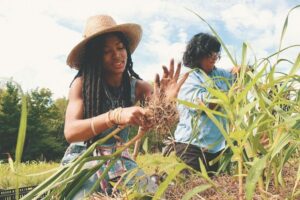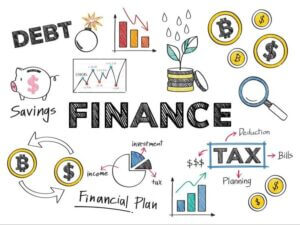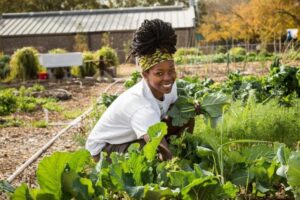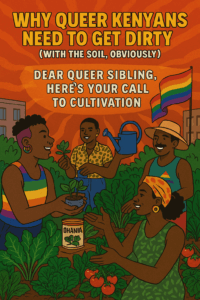Why Queer Folks Need to Get Dirty (in the Soil, Darling)
 Let’s face it: the word literacy sounds like a high school exam you didn’t revise for. But literacy—real, liberating literacy—is just the ability to understand something deeply enough to thrive with it. And in this Kenya of 2024, where unga prices are climbing faster than your ex’s ego, two forms of literacy are becoming essential, especially for queer people: environmental literacy and financial literacy.
Let’s face it: the word literacy sounds like a high school exam you didn’t revise for. But literacy—real, liberating literacy—is just the ability to understand something deeply enough to thrive with it. And in this Kenya of 2024, where unga prices are climbing faster than your ex’s ego, two forms of literacy are becoming essential, especially for queer people: environmental literacy and financial literacy.
Before you roll your eyes and think, “That sounds like a county government-funded workshop with no snacks,” relax. This isn’t a lecture. This is a call to get a little dirt under your nails and a lot more power in your hands. Especially through sustainable agriculture.
First of All—What’s Environmental Literacy?
Environmental literacy isn’t about knowing the Latin name of a tree in Karura. It’s about understanding how climate, soil, waste, and water interact with our daily lives. It’s knowing why Hippo Point smells the way it does in March, or why Nairobi floods the moment clouds sneeze.
For queer Kenyans, this literacy is survival. Many of us live at the margins—literally and figuratively. In informal settlements, in rural areas where queerness is still whispered about, in safe houses or couch-surfing between friends’ bedsitters. We face intersecting challenges: job insecurity, discrimination, and housing instability—while also dealing with climate disasters that don’t care about your gender marker.
Being environmentally literate means we stop waiting for systems that never included us in the first place. We start understanding rainfall patterns, repurposing food waste, saving water, and growing our own food. We claim our place in the ecosystem, not as victims but as stewards.
Okay, But How Does This Affect My M-Pesa Balance?
Enter financial literacy—that elusive dream where you actually understand your bank charges and don’t cry while sending Fuliza requests.
Queer folks in Kenya often find ourselves locked out of economic opportunities. Some of us are cut off from family support after coming out. Others can’t get formal jobs because of how we dress, speak, or love. We end up hustling in gig economies, running small online businesses, or doing odd jobs that barely sustain us.
So, where does environmental literacy come in? Here’s the tea: When you understand your environment, you unlock alternative economies. That’s where sustainable agriculture walks in with a soft but radical queer strut.
Whether you’re growing your own vegetables in buckets behind your mabati house, raising rabbits in your auntie’s shamba, or learning how to turn market waste into fuel briquettes like we’re doing in Kisumu, you’re lowering your costs, increasing your independence, and maybe even building a business.
Sustainable Agriculture: It’s Giving Life, Literally
Queer folks and farming might not be a match you expect to see on Tinder, but hear me out: sustainable agriculture is very queer energy.
It’s all about care. Cycles. Nourishment. Transformation. It’s giving compost and community. And it’s ours for the taking.
We’ve seen this in Kisumu’s queer circles, where balcony gardening has gone from Instagram aesthetic to actual food source. In Vihiga, where young queer folk are rediscovering indigenous farming techniques. Even in Nairobi’s Eastlands, where kitchen gardens double as both sustenance and safe space.
It’s not just about farming, it’s about resilience. Because when we grow our own food, manage our own waste, and learn how to live with rather than against nature, we stop being at the mercy of systems that were never built for us. That’s not just smart—that’s revolutionary.
 Four Real-Life Perks of Getting Queer With the Earth
Four Real-Life Perks of Getting Queer With the Earth
- Food Security, Honey: Whether you identify as gay, non-binary, or a genderful goddess, we all get hungry. Growing your own sukuma wiki, kunde, or terere means less reliance on overpriced markets. It’s literally eating the patriarchy.
- Mental Health Therapy (No Appointment Needed): Gardening is therapy you don’t have to explain to your social studies teacher’s cousin. Being in touch with soil, water, and growth helps calm anxiety—especially in a world that constantly invalidates our identities.
- Entrepreneurial Potential: Learn to make organic compost and sell it in your estate. Start a seedling nursery. Teach kids in your community how to grow tomatoes. There’s a whole green economy and queer folks deserve a seat at the table (and the harvest).
- Community & Collective Joy: Queer farming collectives are the future. They’re safer than clubs, more nourishing than church, and more fulfilling than another day on queer Twitter arguing about labels. It’s shared work, shared meals, and shared love.
Dear Queer Sibling, Here’s Your Call to Cultivation
Look, we’re not all called to become farmers. You don’t need a hectare of land in Kitale to make a difference. But you can start by growing dhania in an old yogurt tin. Learn about composting. Visit a local community garden. Swap seeds at your next queer hangout. Form a farming WhatsApp group called “Sassy with a Shamba.” Honestly, the possibilities are endless.
Because being queer in Kenya already requires innovation, resilience, and community. All we’re saying is—let’s add soil to the mix. Let’s learn how to grow through what we go through.
Because when queer people become both environmentally and financially literate—when we understand how to survive and thrive with the Earth—our lives don’t just become sustainable. They become abundant.
So go ahead. Grab a jembe, wear your shortest shorts, and plant your resistance.
P.S. Don’t know where to start? There are queer-friendly environmental collectives popping up across Kenya. Link up with your local CBOs or ask your grandmother what she knows about traditional planting. She’s probably a whole agroecologist and didn’t even know it. 🌱🏳️🌈
We are creating a #rainbowresilience




